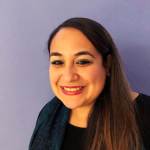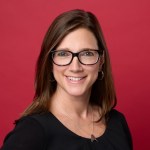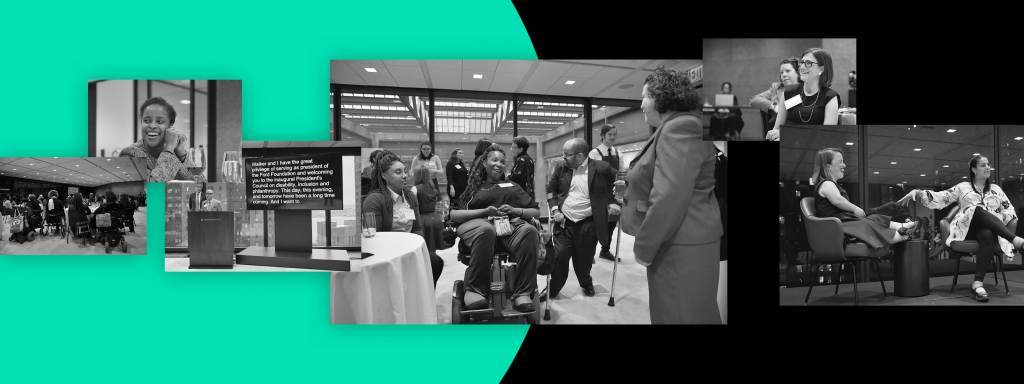
It has been nearly five years since we, as a foundation, pledged to make disability part of our larger commitment to tackling inequality. In this time, we’ve learned so much—and made considerable progress—but we also know there’s so much still left to do as an organization and as a sector. Sharing updates on our work while being honest about what we’re still working through has been central to our journey and crucial for accountability.
This piece is part of Disability Demands Justice, a dynamic, ever-evolving hub to deepen our understanding of how disability intersects with social justice.
This month, while honoring the 30th anniversary of the Americans with Disabilities Act (ADA), we reflect on all we’ve learned, the advances we’ve made, and share what lies ahead. Understanding the rich history of the disability rights movement and recognizing the activists who made disability integral to the fight for social justice and civil rights have been incredibly important to our learning process. We’re especially grateful to Judy Heumann, who not only played an instrumental role in signing the ADA into law, but helped us to lay the groundwork for this robust and dynamic learning journey.
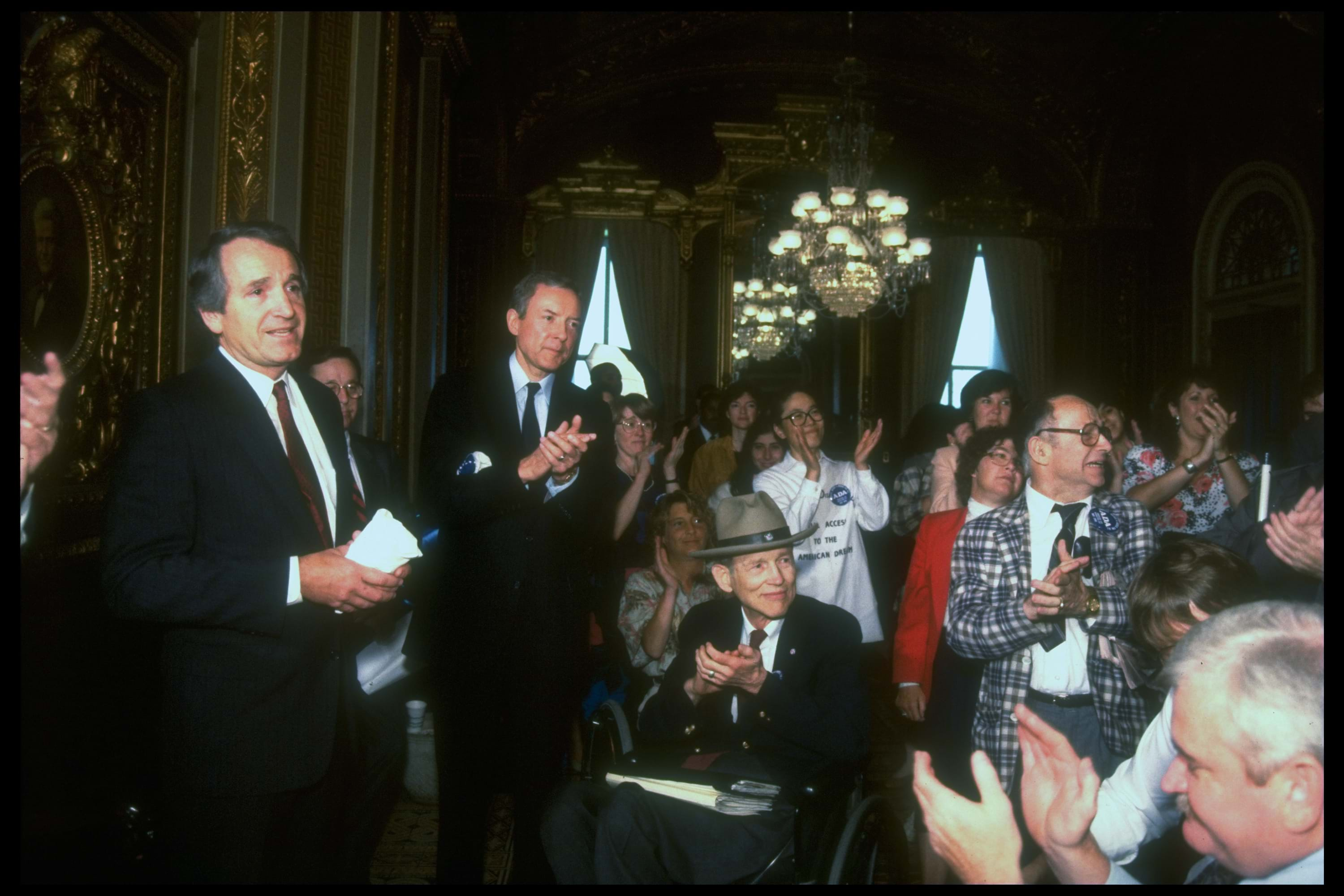
As we have sought to grow and evolve, the world has too—in very dramatic ways. The COVID-19 pandemic has laid bare deep systemic ableism, forcing disability activists to fight the rationing of health care that devalues disabled lives and advocate for access to basic services. At the same time, it is immigrants, indigenous people, and people of color with disabilities—along with disabled LGBTQ+ individuals—disproportionately affected by COVID-19, yet most remain invisible in responses.
As America reckons with its legacy of racial injustice, it is imperative to lift up the experiences of disabled people of color. From Eric Garner to Freddie Gray, more than one third of Americans killed by police have a disability. The invisibility of disability in work to combat police violence is pernicious and only weakens our collective work towards racial justice. Solutions need to both center black disabled men and women and consider historically excluded and multiply marginalized individuals with disabilities, including queer, trans, indigenous people, people of color, women and immigrants who have been ignored in responses.
These uncertain times call for bold ideas and greater collaboration—and we are more committed than ever to partnering with the disability community and continuing our work championing inclusion in both the philanthropic and social justice sectors. We know that embedding disability in all we do, from our operations to our grantmaking, will move us closer to a future of equality and opportunity. Still, too few donors realize the intersectionality of disability and how it strengthens all facets of their work. To date, only two percent of funding for human rights includes people with disabilities. Social justice organizations, as well, need to realize the goals they share with the disability community—and the power the community can bring to actualize a vision of access and equity.
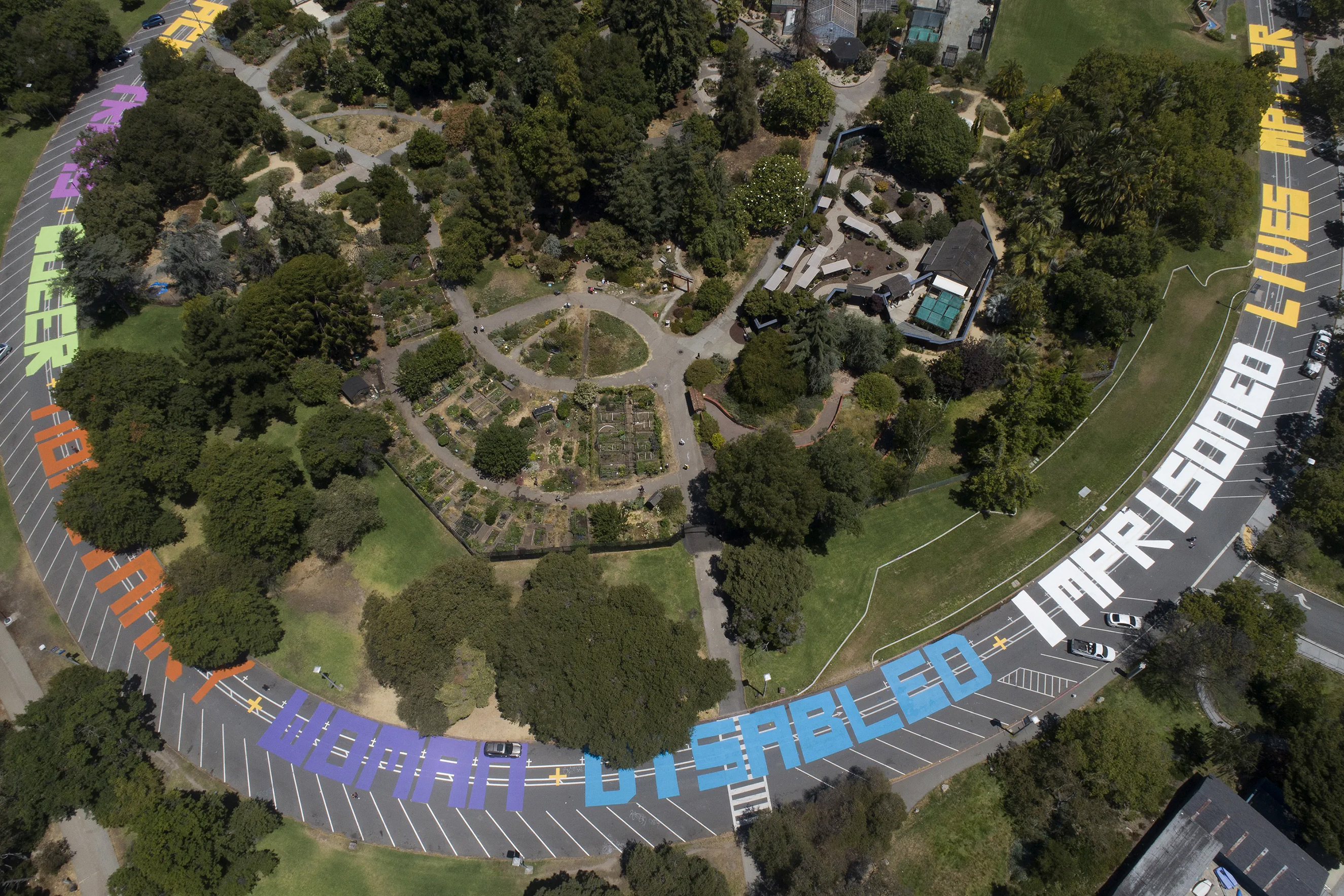
As we respond to the challenges ahead, disability justice provides an invaluable framework, connecting disability and ableism to other forms of oppression, such as racism, misogyny, and homophobia, and proposing solutions designed with and for those who experience marginalization in many ways. For us—and we hope other social justice organizations as well—disability justice offers a path to forge partnerships rooted in equity and solidarity.
We have a lot more to learn to make the values of disability justice real in our work, but it’s been incredible to see how our teams have answered the call, from leadership’s vision for accountability to our colleagues’ eagerness to learn. They have energized our collective commitment and reaffirmed our belief that sustainable, transformational change is only possible when it’s grounded in partnership with the communities most affected.
Investing in a more inclusive world
Grantmaking is the heart of what we do and disability is becoming a greater focus of not just the funds we provide, but the ways in which we work. To date, we’ve invested more than $20 million toward projects and organizations specifically focused on disability and additional $60 million to social justice organizations working toward disability inclusion. Supporting the disability community explicitly ensures that our funding serves its priorities, but we also believe non-disability organizations have a critical role to play to ensure social justice efforts include disability in their intersectional approaches.
Supporting organizations led by people with disabilities
Our grants to support organizations led by people with disabilities have focused on those issues most urgent to the community, from fully inclusive COVID-19 responses to ensuring those with disabilities are counted and heard in this year’s census and election. The Arc of the United States (The Arc), Autistic Self-Advocacy Network (ASAN), and National Disability Rights Network are just a few examples of our grantees helping disabled people fully participate in the democratic process with accessible, inclusive information, outreach and services.
Accessibility Statement
- All videos produced by the Ford Foundation since 2020 include captions and downloadable transcripts. For videos where visuals require additional understanding, we offer audio-described versions.
- We are continuing to make videos produced prior to 2020 accessible.
- Videos from third-party sources (those not produced by the Ford Foundation) may not have captions, accessible transcripts, or audio descriptions.
- To improve accessibility beyond our site, we’ve created a free video accessibility WordPress plug-in.
As COVID-19 spread, mainstream responses not only failed to include disabled people, but intentionally sought to discriminate based on disability status. We supported our grantees as they fought for justice and helped to address other funding gaps to serve the community’s needs.
- The Arc, ASAN, and grantees Bazelon Center for Mental Health Law and the Disability Rights Education and Defense Fund successfully filed a federal civil rights complaint that declared discriminatory healthcare rationing illegal and affirmatively established equal access to care for people with disabilities.
- The Disability Inclusion Fund, created in partnership with other philanthropies, awarded $210,000 of rapid response grants to groups working boldly, creatively, and strategically on responses from mutual aid to policy efforts related to the virus.
- We established The Artist Relief Fund, as part of our work to support Creativity and Free Expression, to help artists economically affected by COVID-19. The fund, which distributes small grants to artists along with other helpful resources, made sure that one in every five artists selected for funding were disabled artists.
Supporting non-disability organizations
Our grants to non-disability groups stretch across our programs, from supporting disabled women disproportionately affected by violence globally to fostering collaboration on key policy initiatives such as COVID-19 economic relief.
In Brazil, for example, we fund Data Labe Association, which works with storytellers with disabilities to develop long-form stories, podcasts, and exhibitions on life in the favelas to tackle the ingrained stigma and discrimination against people with disabilities who are multiply marginalized by poverty and race. In the US, we support the Transgender Law Center, a BUILD grantee, to strengthen the leadership of LGBTQ+ disabled, deaf, and ill people and provide anti-ableism and disability justice training for social justice organizations.
We must continue and deepen our work with non-disability organizations to not only make their operations and communications accessible but also to ensure their programs reflect the leadership and participation of disabled people in social justice movements. Later this year, we will share case studies on disability-inclusive grantmaking and guidance on disability, equity and inclusion to educate our staff and help peer donors. We are also working on a larger-scale approach to providing this capacity-building across the sector.
Letting the work teach us
Learning remains absolutely essential, at an institutional and individual level. From formal training and casual conversations to hearing reflections from members of the disability community, we offer our teams continual learning opportunities.
- In 2018, we created a Disability 101 training to help staff develop an understanding of disability, the challenges of exclusion and inequity the community faces and ways to challenge ableism. This year, we have partnered with teams across the foundation, from IT to events, to customize trainings designed around their roles to apply disability in their everyday work.
- This year, we began to hold a monthly Disability Dish, a virtual discussion with guest speakers from the disability community. This series provides interested colleagues the opportunity to ask questions and engage with experts and activists who generously share their personal and professional stories rooted in intersectional experiences. These discussions have been transformative because they dismantle the silence around disability and allow us to recognize each others’ wholeness and our shared humanity.
- In 2020, we integrated real-time data dashboards and reporting systems to help us assess grantmaking progress across the foundation. Such data collection has helped us to institutionalize our commitment to disability and hold ourselves accountable. We’ve also created a community of practice to foster peer learning around disability grantmaking practice and now include a disability orientation for all new program staff.
Acknowledging that this work is ongoing, we are shifting our learning from a disability inclusion lens to an anti-ableism approach driven by the values of disability justice. We have begun these efforts by establishing a pilot advisory team comprised of disability community members with varied expertise and from different geographies, ages, and sectors to partner with us to design a series of ADA30 events. We are also working closely with our grantee partner, Sins Invalid, to design a half-day staff training on disability justice and discussion on race, disability, and eugenics this fall.
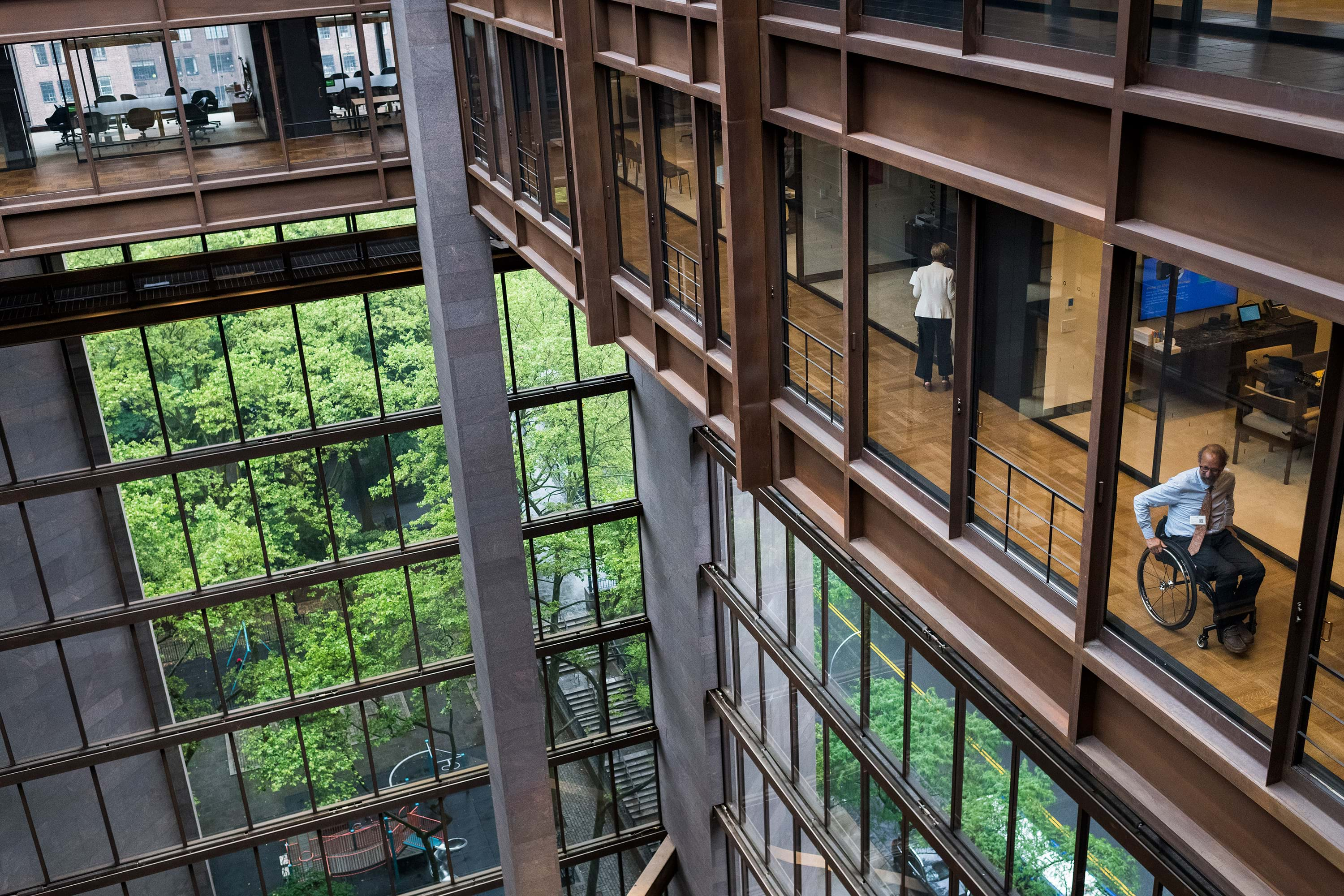
Building a better organization, from the inside out
Since the start of this work, we’ve recognized that we cannot simply fund good organizations but we must become a better, more inclusive organization. We have begun to make considerable efforts to integrate accessibility across our operations and know that this work is complex and requires sustained effort and collaboration. To be clear, there is no checklist to complete. Accessibility is ongoing, relational and requires staff engagement from across the foundation.
- Our Headquarters. During the renovation of the Ford Foundation Center for Social Justice, we ensured that the building was ADA-compliant and more inclusive than ever before. Over time, we heard from the disability community and we listened, adding more push buttons to doors, adjustable lighting, and detailed accessibility information for meeting rooms. Once the building reopens, we plan to conduct a full audit to identify further improvements, particularly in our garden and entry. A community advisory group will guide our work, so we make adjustments to improve the experiences of the diverse, disability community.
- Hiring and Employment. We continue to refine our approach to recruit individuals with disabilities and make our recruitment process more transparent and accessible by asking all candidates about accommodation needs and developing a toolkit with guidance on interviewing and managing candidates with disabilities. Our global team, however, does not yet represent our commitment, but we are continuing to learn and pushing ourselves to be better. We have put into place critical building blocks—from internal training to a disability accommodation policy to an employee resource group—to build a more truly inclusive team in the near future.
- Events. Our events team has been working with consultants and grantees to develop best practices around accessibility. This includes creating accessible invitations, surveying attendees on their accommodation needs, providing access guides in advance of an event along with a variety of accommodations (CART, ASL, and captioning) during, and providing captioned videos. Embedding accessibility into all events benefits not just disabled participants but all attendees.
The journey ahead
As we look ahead to the future, we are immensely grateful to our advisors across the disability community and our colleagues who have played important roles moving this work forward. There is still much left to do to fully realize “Nothing about us without us” and genuinely live the values of disability justice. But publicly committing to this work has been incredibly important, forcing us to hold ourselves accountable and remain open to listening and receiving feedback from our partners in the disability community.
We have come a long way since we started and we feel more certain than ever that together with our philanthropic partners, we can transform philanthropy to better serve the disability community. Alongside our peers in the Presidents’ Council for Disability Inclusion in Philanthropy, we support the growing Disability Inclusion Fund and the council’s Disability & Philanthropy Forum provides a hub for learning about disability inclusion in philanthropy, with a grantmaking guide, advice about hiring, videos, and more.
As the saying goes, “The more we learn, the more we learn we don’t know.” This is hard work and we think it’s critical to be transparent about our challenges and continue to share how we hope to expand our efforts. These last five years have been transformative for all of us at Ford and every day we feel the weight of this journey. What we know for sure is that in demanding more of our organization to change and deliver for others, we are moving closer to realizing our mission of ending inequality and expanding equity for all.
This piece is part of Disability Demands Justice, a dynamic, ever-evolving hub to deepen our understanding of how disability intersects with social justice.

